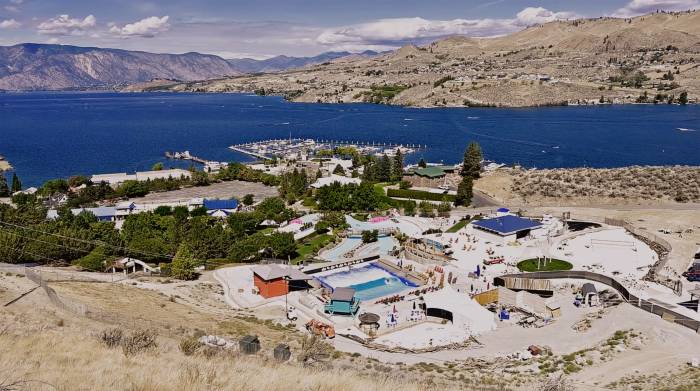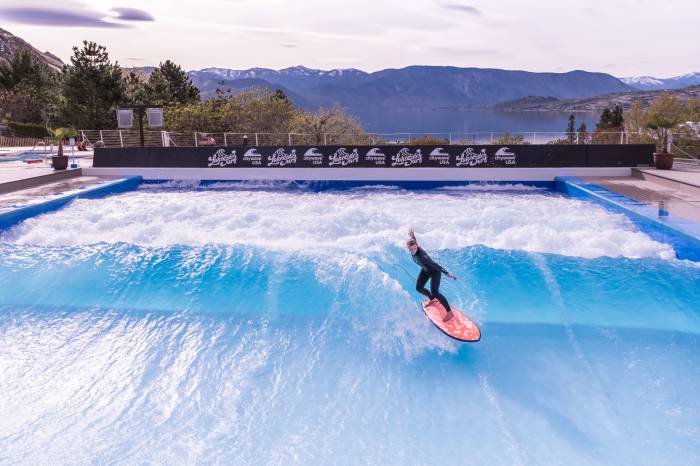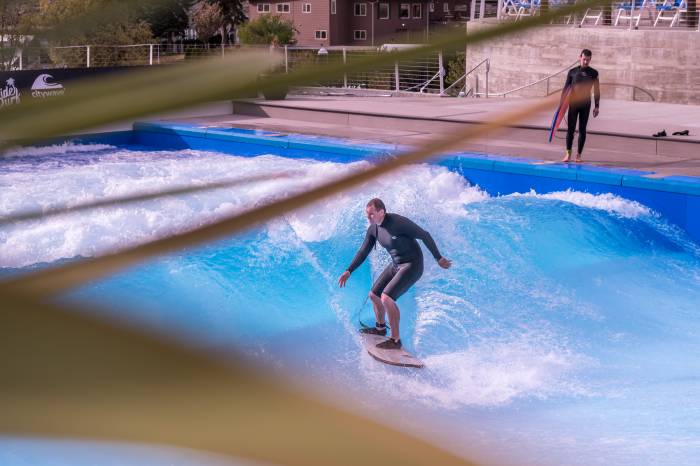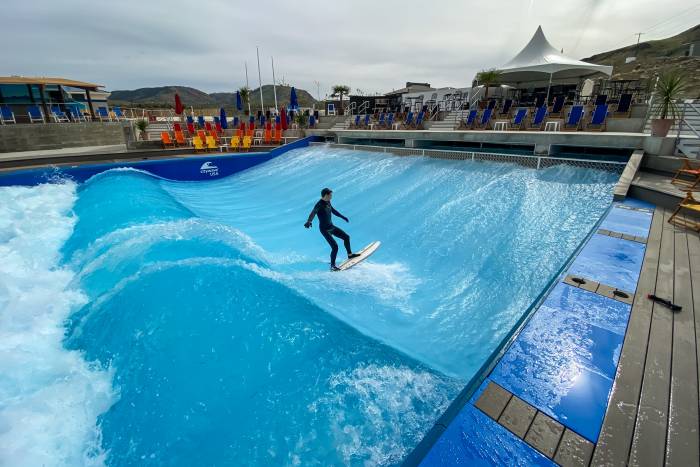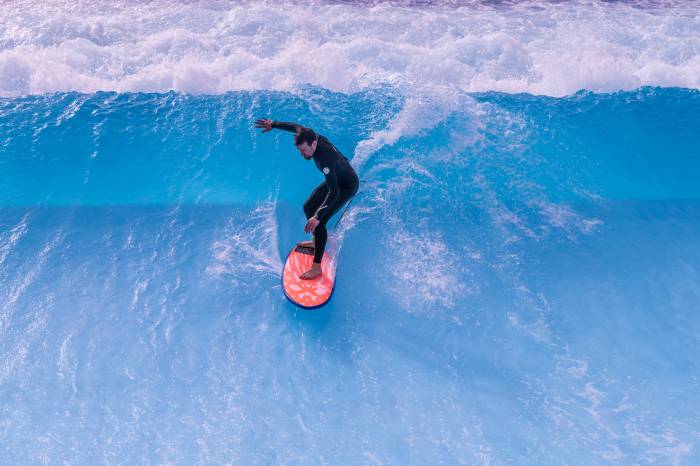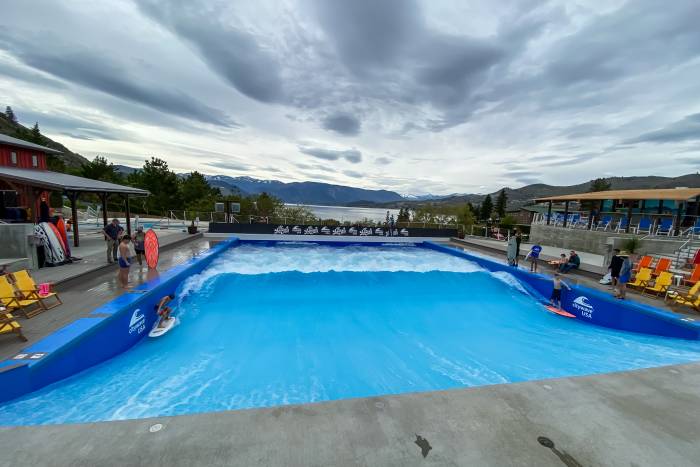Surf the World’s Largest Artificial Deepwater Stationary Wave: CityWave USA
We tested the world’s largest artificial stationary deepwater surf wave. Here’s how it went.
High above Washington’s Lake Chelan, I walked through the gates of Lake Side Surf and heard the roar of the CityWave USA man-made surf wave — the largest of its kind on Earth.
I know, there are a lot of clauses in that statement: the world’s largest artificial stationary deepwater surf wave. But they all are important. This wave does not travel anywhere, yet it’s deep enough for a surfboard with a proper fin setup. That’s a rare combo.
With this setup, you can grab the surfboard you have, or one of Lake Side Surf’s loaners, hop on the wave, and hang ten. No getting pounded by set waves, no jostling for position in the lineup, and no surfing on a tiny skateboard/skimboard-like device as you do with most artificial sheet waves (like FlowRider waves).
After two long sessions on the CityWave USA feature at Lake Side Surf, I can assure you that this is a surfing experience not to be missed!
Lake Side Surf: CityWave USA
I love to surf, but I dislike surfing. I’m an expert kayaker, decent wakesurfer, hack kitesurfer, pathetic wave SUPer, and a not very good surfboarder.
All that is to say that I don’t like flopping around in the ocean taking waves on the head, but I crave the feeling of being on a wave face surfing. The Lake Side Surf CityWave USA wave is the perfect venue for someone like me: maximum time surfing time without most of the other obstacles inherent in getting on a wave.
It took an extra year, due to COVID, to get this wave operational and open, but on May 1, 2021, it launched to its first paying guests. I can assure you it was worth the wait! The CityWave surf wave feature is located within the Slidewaters water park on a hillside above Lake Chelan, Washington.
Why Chelan, Washington?
You might ask why this massive manufactured surf wave is seemingly in the middle of nowhere, Washington. The primary reason is extremely cheap local hydropower, the second-cheapest in the country. It requires a lot of electricity to run the pumps on one of these waves, which makes it cost-prohibitive in many areas, especially at this scale.
Beyond that, Chelan has an abundance of water, a big seasonal tourist industry, and an established 40-plus-year-old water park.

How Much Does It Cost?
There are a few ways to get on this wave. The first is to pay to enter the Slidewaters water park, about $30, when it opens on Memorial Day weekend.
The park is open from 10 a.m. to 7 p.m. and for the first 2 hours, until noon, guests can sign up for 30-minute surf sessions on a first-come, first-served basis. The max session size is 12 people.
The next way to surf the Lake Side CityWave is to sign up online, or in person (if there are open spots available) for a 45-minute session between noon and 7 p.m. each day. These sessions cost $30-35 per person and also max out at 12 people per session.
With this option, a pass to the water park is also required (during water park hours), so the surf session adds about $30 to the park entrance fee.
However, if you want to choose the wave size and shape that best fits your skill level, your best bet is to rent out an entire session for $310-370.
You can invite up to 11 of your friends to join you or just shred it all yourself. Surf Club, Season Pass, or Dawn Patrol multisurf session packages are also available.

Other Slidewaters/Lake Side Surf Amenities
Besides the insanely good surf wave, which is perfect for first-time surfers and experienced pros alike, the Slidewater and Lake Side Surf facilities are loaded with other amenities that cater to the whole family.
Of course, there are the Slidewater water park features, which looked like a blast. There are also multiple perfectly groomed beach volleyball courts, a hot tub to stay warm between surf sessions, and a bar and grill.
The park also has a high ropes course and a zipline under construction. Both will be separate operations with additional costs, but will all contribute to the same day of adventurous fun.
CityWave: How It Works

There are lots of various artificial surf waves around the globe, with more and more under development. Most are sheet waves, meaning they are stationary and have a very fast, thin flow across a waveform.
These waves only accommodate small, finless boards, but allow for long surfs on a stationary wave. And these can even be shaped into a barrel, in some cases.
The other main type of artificial waves, which have been catching the headlines lately, are wave pools. These more replicate ocean waves, as the wave is generated by the sudden displacement of water. It then rolls across a contoured pool to create a wave one can surf from one end of the pool to the other.
The key here is that any surf craft that works in the ocean will work on one of these waves. The drawback is the relatively small amount of waves this machine can make compared to a standing wave, and the time it takes to get back out to the wave takeoff point.
The CityWave surf feature is a standing wave that is also deep. It allows for lots and lots of surfing on standard surfboard equipment.
Twelve pumps raise up to about 600,000 gallons per minute to the top of the inflow to the wave. The water then runs through two layers of many small tubes, which evenly distribute the water across the 52-foot wide wave surface (at Lake Side Surf, the largest in the world).
Operators can fine-tune the size of the wave via a single digital control panel. Generally, the more water flowing into the wave, the bigger it is.
But there’s more magic to how these waves work. The velocity increases as it goes down the ramp and hits a small adjustable lip. This lip kicks the water up and creates the steepness of the wave shape.
Similarly, this can be fine-tuned to create a beginner-friendly wave or a steep wave with a sharper lip to huck air off of.
Behind this lip is an area where the water recirculates, like a hydraulic/hole in a river, and then flows out over a ramped grate where water flows back to the pumps.
This aerated hole behind the wave provides a pretty soft landing when you fall. It also helps create the backpressure required for the wave to retain its shape.
Mind you, that is just a basic observation of how the CityWave works. A lot of the details are proprietary, as there are lots of companies out there hoping to create the perfect artificial surf wave.
Tips for Surfing a CityWave

After surfing this amazing wave at Lake Side Surf, as well as having surfed the Tokyo CityWave just before the pandemic, I’ve learned a few tricks to make your experience the best it can be.
First: Relax, smile, and go with the flow. Start with small motions and stay balanced over the board, a bit further toward the tail than you might expect — bend in your knees and not your waist.
Also, look up and sight where you want to go, not down at the board. Initiate turns with your shoulders and arms, and follow through with hips and then rail pressure on the board,
Also, know that you will fall/crash. It’s all part of the fun. The aerated water behind the wave can recirculate you a few times, but it’s not really a big deal.
The best way to come up for air the quickest (and not get tumbled) is to hold your breath, starfish (don’t ball up), and then just wait for the water to spit you out the back onto the grate.
Be sure to protect your face with your hands as you get up, as your board will probably come after you — and fins hurt.
Possibly the biggest tip is to share the stoke. Bring friends and family who will surf and crash/fall with you. The stoke is contagious, and it’s really fun to share it with people you know.
You can totally go yourself, as well. The stoke is so contagious that you’ll receive plenty of hoots and hollers from others in your session.
CityWave Surfing Around the Globe
This is the 13th CityWave surf wave in the world — and it’s by far the largest. It is wider and has more pumps, so you get more water and a slightly taller wave. The width is great for having two surfers enjoy the wave at the same time, with plenty of room to move around.
This means more surfing time for everyone in each session. The height is also awesome because it allows you to do bigger carves and generate more power for all kinds of tricks. Bigger is better!
If you couldn’t tell, I’m still high on stoke from my experience at Lake Side Surf and can’t wait to get back. I’m still smiling. And I learned so much more than I would have trying to catch waves in the ocean.
Now, I can bring these new skills to the ocean, behind a boat, or back to another CityWave surf feature.
The post Surf the World’s Largest Artificial Deepwater Stationary Wave: CityWave USA appeared first on GearJunkie.

